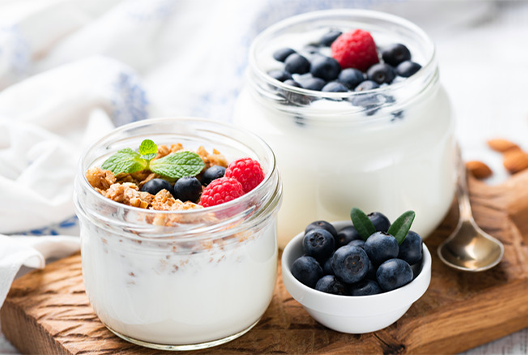
Greek Yoghurt vs. Regular Yoghurt: Which One Is Right For You?
Similar
Yoghurt is a staple in many diets across the globe and is known for its creamy texture and tangy flavor. This versatile, protein-packed food can be enjoyed with fruits, nuts, or savory ingredients. While several types of yoghurt are available in the market, two of the most popular varieties are Greek yoghurt and regular yoghurt. With Baladna's range of high-quality yoghurts, it's essential to understand the differences between these two types to determine which suits your taste and nutritional needs better. In this blog post, we will compare Baladna Greek yoghurt and regular Baladna yoghurt to help you make an informed decision.
Baladna Greek Yoghurt vs. Regular Baladna Yoghurt: What's the difference?
1. Production Process
Greek yoghurt and regular yoghurt begin with the same ingredients — milk and live bacterial cultures. However, the production process differs slightly, resulting in unique textures and nutritional profiles.
Regular yoghurt is made by fermenting milk with live bacterial cultures, allowing the bacteria to convert lactose into lactic acid. This process thickens the milk and gives yoghurt its characteristic tangy flavor.
On the other hand, Greek yoghurt undergoes an additional step after fermentation. The yoghurt is strained to remove excess whey, resulting in a thicker, creamier consistency. Baladna's Greek yoghurt is made using a traditional straining method that ensures its signature rich texture.
2. Texture and Taste
The most apparent difference between Greek yoghurt and regular yoghurt is its texture. Greek yoghurt is thicker and creamier, owing to the removal of whey during the straining process. Regular yoghurt, while still smooth, has a thinner consistency.
Taste-wise, Greek yoghurt is often described as having a more concentrated flavor due to its reduced whey content. It has a slightly tangier taste than regular yoghurt, which may be milder and sweeter, depending on the brand and variety.
3. Nutritional Differences
Greek yoghurt and regular yoghurt also differ in their nutritional profiles. Here's a breakdown of their key nutrients:
Fat: The fat content in both yoghurt types depends on the milk used during production. Both Greek and regular yoghurt have full-fat, low-fat, and fat-free options. Baladna offers full-fat Greek yoghurt and a range of regular yoghurt options, including low-fat and fat-free varieties.
Calcium: Regular yoghurt typically has a higher calcium content than Greek yoghurt. The straining process in Greek yoghurt production removes some of the calcium-rich whey. However, both yoghurt types still contribute to your daily calcium intake.
Probiotics: Greek and regular yoghurt contain live bacterial cultures (probiotics) that can benefit gut health. Some brands may have more probiotic strains than others, so checking the label for specific information is essential.
Is one better than the other?
The choice between Greek and regular yoghurt ultimately depends on your taste preferences and nutritional needs. If you prefer a thicker, creamier texture and tangier taste, Greek yoghurt may be the better option. Additionally, it's an excellent choice for those looking for a higher protein and lower carbohydrate content.
Regular yoghurt is still nutritious, with a milder flavor and thinner consistency. It may be more suitable for those who require a higher calcium intake or prefer a gentler taste.
It’s a yoghurt world
Baladna yoghurt products ensure that you can enjoy the benefits of both Greek and regular yoghurt, depending on your preferences. Whether you prefer the tangy taste of Greek yoghurt or the creamy sweetness of regular yoghurt, both can be part of a healthy and balanced diet.
Are you looking for high-quality yoghurt? Baladna provides authentic, fresh, and quality dairy products. Our farm can house up to 24,000 cows in a comfortable and well-conditioned environment, allowing them to reach their production capacity comfortably. Browse more of our products today!



